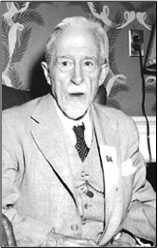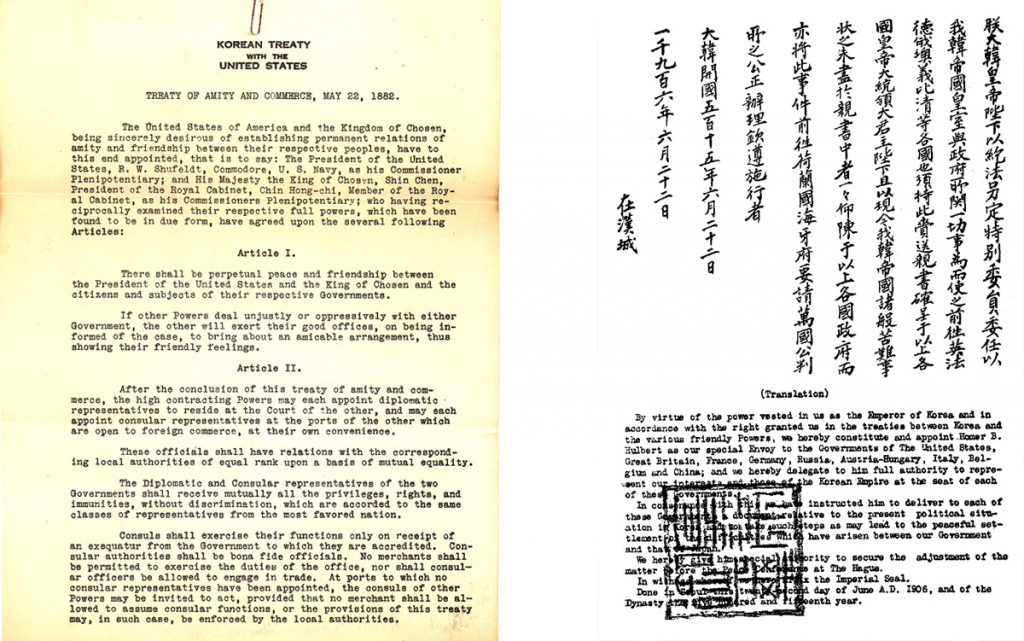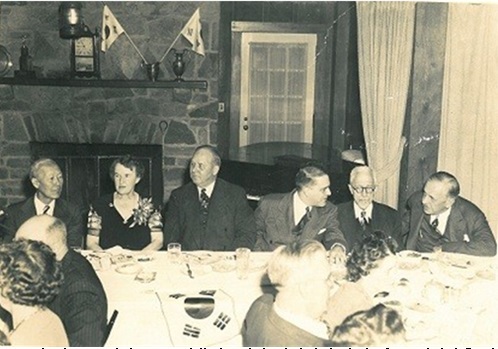 An Advocate for 63 Years
An Advocate for 63 Years
Homer B. Hulbert made a lifelong commitment to educating and advocating for Korea. While most of his reputation and prestige comes from his efforts in the education sector, his work in the advocacy and liberation of Korea cannot be ignored. As a close friend to the Korean emperor, he was personally selected to be sent on diplomatic missions all around the world, whether this was delivering personal letters to heads of states, escorting emissaries to conferences, or petitioning the U.S. government to take action. Hulbert spent 63 years of his life as a Korean advocate, and he gained a reputation as the foreign champion of Korean independence, both inside and outside the Korean Peninsula. An indefatigable advocate of Korean progress and independence, he persevered through setback after setback, never ceasing until Korea was finally free from Japanese control.
Korea’s Envoy to the United States
In 1882, four years before Hulbert arrived in Korea, the United States and Korea signed a joint treaty, known as the “Treaty of Peace, Amity, Commerce and Navigation”. The treaty established diplomatic relations, defined the two countries’ trade status, promised mutual assistance in case of an attack, and discussed U.S. citizens’ extraterritorial rights. However, the most crucial clause of the treaty was the first article, which provided, “If other powers deal unjustly or oppressively with either Government, the other will exert their good offices on being informed of the case to bring about an amicable arrangement, thus showing their friendly feelings”. To put it simply, the clause was aimed to protect either country from the unjust and oppressive treatment by a third party and should this occur, both countries promised to provide assistance. Unfortunately, when Japan began to interfere with Korea’s sovereignty, the U.S. failed to abide by these provisions, breaking the treaty. Thus, the then emperor of Korea, Emperor Gojong, assigned Hulbert the role of envoy and sent him to the United States in order to plead Korea’s case in front of then President Roosevelt.
Hulbert left for the United States in 1905, around mid-October, bearing the emperor’s private seal, which was a symbol of his imperial authority. He also carried a letter that noted the friendship between the two countries, reiterating the provisions provided under the Treaty of 1882, in which the United States promised to protect against third party intervention, intervention much like what Japan was currently doing in Korea at the time. Hulbert arrived in Washington a month after his departure, and immediately went to the White House. He was denied entry, so Hulbert worked for several days to find someone to accept the emperor’s plea. Hulbert delivered the letter to the Secretary of State, but the Secretary’s comments about not provoking the Japanese, and President Roosevelt’s firm refusal to meet with Hulbert solidified the fact that the United States had chosen to abandon Korea and break the treaty to instead support Japan. Hulbert denounced the U.S. and Roosevelt, stating “The US handed Korea to Japan.”


The Fourth Secret Envoy to the Hague
With the United States’ failure to uphold its promises to Korea, Emperor Gojong sent Hulbert to try and get assistance from several other countries. In 1907, the Hague Peace Conference was to be held, and it was determined that this would be the best place to plead for Korea’s case on the international stage. While Hulbert acted as a secret envoy, his role was mainly to secure support for three other envoys and get them into the conference. Later known as the ‘Hague Secret Emissary Affair’, the three envoys sought to declare the illegality of the Eulsa Treaty, which deprived Korea of its diplomatic sovereignty and effectively made it a protectorate of Japan. Since the treaty was signed under duress, Emperor Gojong wanted them to gain international recognition of Korea as a sovereign state and to protect the country from annexation by Japan. The group was blocked from entering when Japan learned of their plan, but Hulbert and the other emissaries still managed to garner public support by speaking outside of their hotel to foreign press members. When Japan learned of this, they punished Korea by forcing Emperor Gojong to abdicate his throne to his son, and expelled Hulbert from ever returning to Korea. With these final actions, Korea was completely under Japanese control.

Forty Years as an Independence Fighter
Despite his expulsion from Korea in 1907, Hulbert never stopped advocating for the country. For forty years, Hulbert traveled throughout the United States and the world to educate and advocate for Korea’s independence and sovereignty. In his lifetime, Hulbert gave 1,000 lectures on the subject of Korea, and had almost 5,000 newspaper articles and interviews. In 1919, following the 3.1 Revolution in Korea, Hulbert filed a statement called “What About Korea?” to be introduced into the Senate. With the help of a Missouri senator, Hulbert reminded the Senate of the 1882 Treaty, and recounted the illegal takeover of Korea through the Eulsa Treaty. Hulbert’s resolutions only gained nominal support on the Senate floor, but the lobbying efforts of Hulbert and other missionaries generated public attention to the issue and started debates within the U.S. government.

Liberation and Return
When Hulbert was 82, Korea finally achieved its independence when Japan surrendered unconditionally following World War 2. Once Syngman Rhee was elected president, he invited Hulbert back to Korea, though Hulbert had to delay for one year on account of his wife’s health. At the age of 86, Hulbert took his first step back in Korea in over forty years. Sadly, Hulbert contracted pneumonia upon his arrival and passed away one week later. He was buried with full honors and posthumously awarded the Order of Merit for National Foundation (건국훈장), and now rests in the Yanghwajin Foreign Missionary Cemetery, where his tombstone reads, “I would rather be buried in Korea than Westminster Abbey.”
From his first step on Korean soil to his last, Homer B. Hulbert was an international advocate for Korea for over 63 years. He crossed oceans and continents to deliver the words of the Korean emperor, tirelessly pleaded with heads of state for Korea’s freedom, and even risked his life to oppose the Japanese. He was a hero to the Korean people, and as the famous Korean freedom fighter Ahn Jung-Geun said, Homer B. Hulbert is “One who should not be forgotten by Koreans for even a single day.”
Written by: Mackenzie Migdal
Originally from New Mexico in the United States. Current fifth-year undergraduate at the University of Hawaii at Mānoa as a B.A. Candidate for Korean for Professionals and a B.A. Candidate for Political Science. Exchange student at Korea University, Intern at VANK (Voluntary Agency Network of Korea)